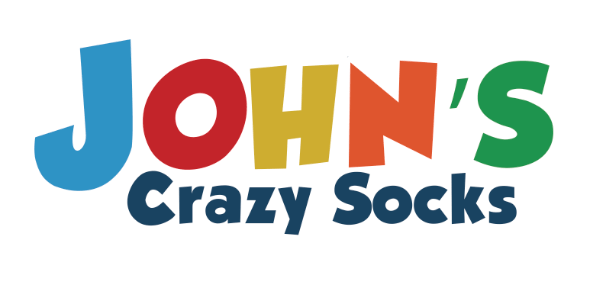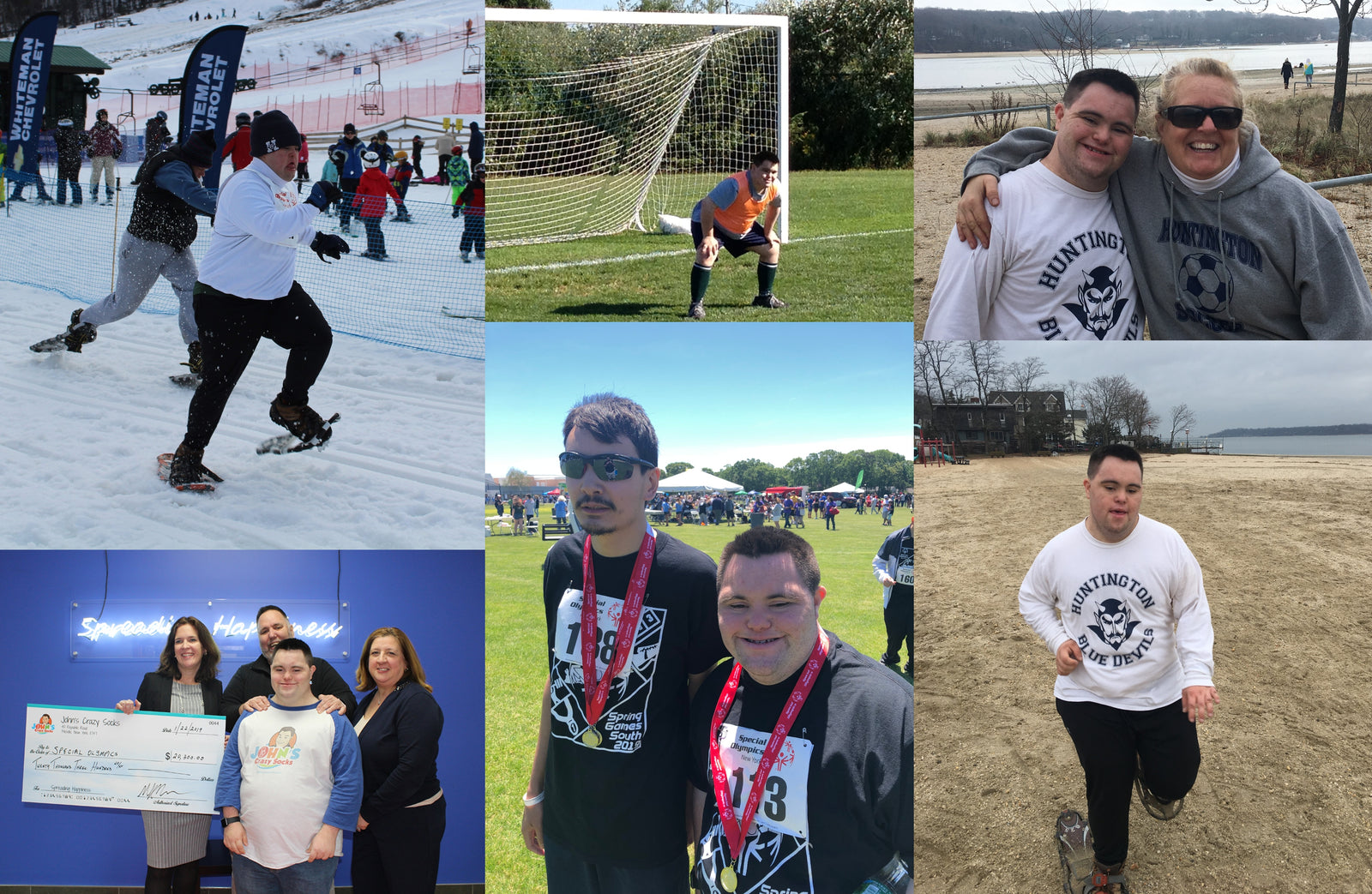We often say that without the Special Olympics, there would be no John’s Crazy Socks. The Special Olympics has had a profound impact on John’s development and character and it is hard to imagine that John would ever have been able to start his own business if not for the skills and life lessons he learned from competing as a Special Olympics athlete.
John puts it more simply, saying, “I Love the Special Olympics.”

Don’t Tell Me that It’s Good for Me, Special Olympics is Fun
John started playing Special Olympics soccer with the Huntington Boys Club when he was five years old. It sometimes seemed that the ball was bigger than him. John didn’t join the soccer team because of the wonderful virtues it would instill in him; John played soccer for one basic reason: it was fun.
John watched his older brothers compete in various sports and would go to their games to cheer for them. Like many younger siblings, John wanted to do what his older brothers did. If they could play sports, why couldn’t he?
When he learned about the opportunity to play soccer, John jumped at the chance. He got to run around on the field and meet new people. He would trip over the ball or trip over his own feet, but he had coaches and teammates helping him up and showing him what to do. He loved everything about it: putting on his uniform, lining up for drills, showing the coaches that he could do what they taught him.

Twenty years later, John is still playing for the same soccer team and the same coaches. Along the way, John has added other sports, so now he competes in basketball, track and field and snowshoe. For years, he played floor hockey and would go bowling, but those sports fell off and he concentrates on the sports he likes the most.
Ask John about the Special Olympics and he will tell you, “I love it. I love being with my teammates. I love running. I love going to meets. I have so much fun.”
There’s So Much More to the Special Olympics
For ten years now, John has been competing in Special Olympics snowshoe races. His coach, Linda Costello-Roth, recruited John and his teammates to try this new sport. It involves strapping snowshoes to your feet and racing. The shortest races are 25 meters and the longest 800 meters. John’s team, the Huntington Blue Devils, is based in Huntington, New York, a town on Long Island about 35 miles outside New York City. The team competes in two events each year. At the end of January, they travel upstate to a meet at West Mountain and in mid-February, they compete in the New York State Games, usually in an upstate location.

This team starts training in the summer on the beach and in their coach’s pool. Think about that for a moment: they have only two meets and yet they start training six months earlier. They can focus on a long team goal and have the discipline to put in the work and effort to get better.
And they do not simply go out and run around. Their coach puts them through a demanding work out – short sprints, long runs, practicing starts, running over a small hill – all designed to help them compete better. There are times when they are tired and their teammates and coach pick them up. There are times when they lag, and their teammates and coach exhort them to push harder. They fall down – and if they are on the beach that may mean getting a mouthful of sand.
When the Blue Devils show up at a meet, they compete in individual events. John will usually run the 50 and the 100 meter, and one relay. The relay is always the biggest race for them because they are running for their teammates. Compete they do: they run hard and each wants that gold medal. Their work often pays off with a shiny medal, but not always. And these athletes learn the joy of victory and the bitterness of defeat.

Over the years, John has gone to the medal ceremony dozens of times. He has stood on the gold medal platform and stood on the side receiving not a medal, but a ribbon. And here is what the Special Olympics has taught him: no matter if he is receiving a gold medal or a ribbon, John thanks the presenter and shakes hands with his competitors, congratulating them on their race.
John’s teammate, Liam, ran so well that he was was invited to join the national team and compete in the World Games in Austria. No one was happier for Liam than his teammates.
Now think about what I described: focusing on a long term goal, discipline, teamwork, the ability to be coached, the ability to persist even after a defeat, an intense focus on performance and sportsmanship. Aren’t those qualities that any employer would seek in an employee? Aren’t those traits that would serve an entrepreneur well?
It’s the Effort, Not the Natural Talent
A hallmark of the Special Olympics is the way they group athletes with similar athletic results. What does that mean? John may like to compete in races of all sorts, but he is not naturally a fast runner. The Cronin men have run marathons, but sprints are not our strength and so it is with John. But Special Olympics does not pit John against the fastest runners. It matches him with runners in his age group with similar outcomes. This approach leads to even fiercer competition.
And make no mistake, these athletes compete. Go to a track meet and watch John running down the track in a 100 meter race: he is giving his all, determined to win that race, you can see it is his eyes, in the way he pumps his arms, in the way he churns his legs. It is a sight to behold.

He does not always win. In fact, he rarely wins the gold in a sprint, but that does not diminish his effort. And the Special Olympics have helped him to understand that in the end, he is racing against himself, trying to do the best job he can on the basketball court, the soccer pitch, the track or the snowshoe course. When he finishes a competition, he feels good as long as he did his best.
The More You Give, the Better Off You Are
John offers two keys to happiness: do for others and have gratitude. John applies this to his participation in the Special Olympics. Long before he had his business, John wanted to show his gratitude for all the Special Olympics gives him. For the past eight years, he has raised money for Special Olympics by doing a polar plunge. Now that’s commitment.
One time, while joining other athletes and their families meet with members of Congress urging the representatives to vote in favor of a grant for the Special Olympics, John said, “All we are asking you to do is vote yes, I jump in freezing water for the Special Olympics.”

John was also invited to serve on the Athlete Leadership Council with the New York State Special Olympics. This group of athletes provides feedback to the leadership of the State program and share information to their fellow athletes. John views his role on the leadership council as a great honor and it is another way that the Special Olympics is helping John grow as a person.
What’s This Got To Do with Starting and Running a Business?
How many of us have had an idea for a business? How many of us have said, this would be a good idea? And how many have let it drop just like that?
That’s not what John did. He had an idea and immediately set to work to make it a reality. It is the same approach he had when he started playing soccer or took up snowshoeing. He had gained confidence from the Special Olympics to know that if he wanted something, if he was able to work at it, he could succeed.
Taking the entrepreneurial path is not for the faint-hearted. Success is not guaranteed – most business fail within three years of starting – and there are many failures and hard times on the way to success. An athlete who starts training in the summer for a winter snowshoe meet knows all about commitment, understands what it means to work for a goal and purpose. And a basketball player who has his shot blocked by a much taller player, but knows to immediately fall back on defense or a runner who gives it his all only to have another runner pass him in the final meters of a race, that athlete understands failure and how to get up and keep going.
When starting a business, there is so much to learn, so many new challenges and new skills you need just to get going. An athlete who first confronted a soccer ball big enough to knock him down who now knows how to run the field, how to space, how to make passes to teammates, that is an athlete who knows the importance of continually learning and how it is possible to learn.
One can see this habit of mind in John’s public speaking. This is a young man who for the first several years of his life could barely speak. He learned American sign langue to communicate and used an assistive communication device. Now he can stand in front of a corporate audience of 5,000 people and wow them. He had the confidence that comes with performing in the Special Olympics. He knew to take coaching from his speech teacher at Huntington High School, Patricia Klee, and from his father and business partner. He pays attention to other speakers and learns from each appearance. He practices and works to improve.

As any business leader can tell you, no one can do this alone, it takes a team to succeed. Our schools often emphasize individual work, but the Special Olympics are all about teamwork. The Special Olympic athletes understand how to trust and rely on teammates and how to earn a teammates’ trust. A Special Olympic athlete understands that the whole soccer team is much more powerful than any collection of individual players.
In short, it is hard to see how John would have the confidence, the commitment, the perseverance and the ability to overcome defeats in his business if he had not participated in the Special Olympics.
Giving Back
John knows how much he has benefited from participating in the Special Olympics. In keeping with his approach in life, John demonstrates his gratitude by giving back. From the beginning, John has pledged five percent of profits from John’s Crazy Socks to the Special Olympics. He wants the Special Olympics to share in any benefits he receives.

We have gone on to create special products that celebrate the Special Olympics and raise money for the Special Olympics including our Shark Socks, made to honor the Commack Sharks where John plays basketball and runs track and field, and Polar Plunge Socks. In addition, we donate 5 percent of the sale from the Sock of the Month Club to the Special Olympics.
Here is a really cool fact; John, a Special Olympic athlete, has now raised over $100,000 for the Special Olympics. Could there be any clearer sign of how much the Special Olympic has done for John and his affection for the Special Olympics?




